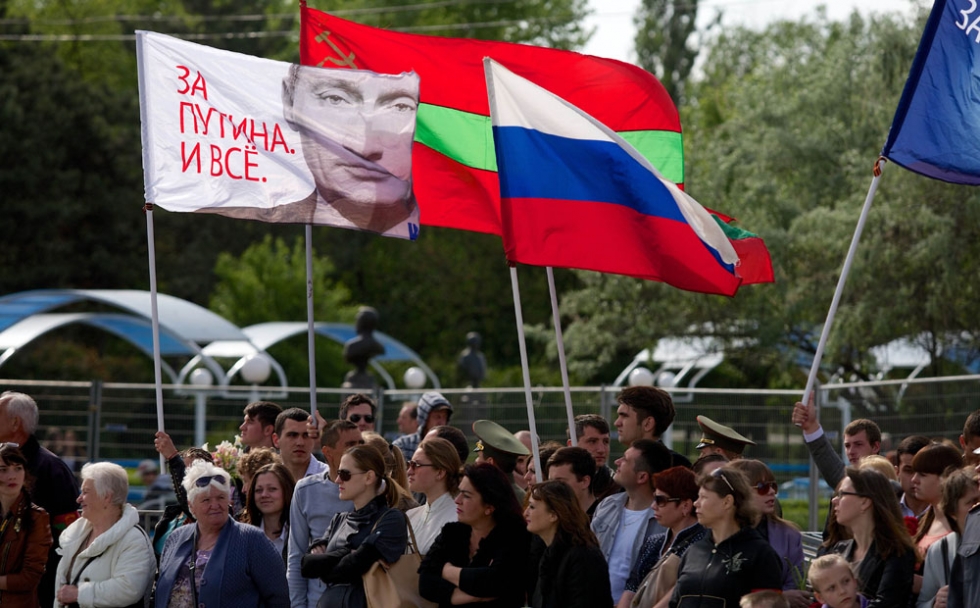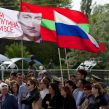
Moldova Sending Confusing Signals Amid Open Russian Threats
Publication: Eurasia Daily Monitor Volume: 11 Issue: 97
By:

On May 19, speaking on a talk show aired on Noroc TV, Moldova’s Prime Minister Iurie Leanca made a number of revelations about what he referred to as the current cooling state of diplomatic relations between Moldova and Russia. In particular, Leanca highlighted a canceled visit to Chisinau that Russian Foreign Minister Sergei Lavrov had been expected to make in April 2014. Leanca also regretfully admitted that his own trip to Moscow, which had been planned for this month, was no longer taking place (noroc.tv, May 20).
Prime Minister Leanca’s admission as to the strained nature of bilateral relations with Moscow was made in the aftermath of a recent incident involving a Russian delegation led by Deputy Prime Minister Dmitry Rogozin, who also serves as Russia’s presidential envoy to the breakaway Moldovan territory of Transnistria. The group visited Transnistria, on May 9, to take part in Victory Day celebrations commemorating the defeat of Nazi Germany in World War II. Over the last few years, local pro-Russian activists across various post-Soviet countries have been organizing annual Victory Day celebrations with ever more pompous grandeur. Such activity is funded and politically supported by the Russian government though its embassies, becoming an element of Moscow’s larger soft power strategy toward Russia’s “near abroad.” Such public commemorations are meant to downplay the criticism of the Soviet occupation of Eastern Europe after World War II, instead presenting it as a liberation of the region from Nazi Germany. Rogozin emphasized that his delegation’s visit to Transnistria was directly sanctioned by the Russian president and prime minister (lentapmr.ru, May 9).
At the same time, however, Rogozin’s visit to Transnistria appeared to be an element of a consistent Russian foreign policy strategy toward Moldova. By lending political support and informal recognition to the separatist administration in Tiraspol, such visits simultaneously serve to put political pressure on Moldova to discourage it from signing the Association Agreement with the European Union.
Rogozin’s Transnistria trip ended with a negative diplomatic incident. As the Russian delegation prepared to depart back to Moscow from Chisinau airport, Moldovan law enforcement authorities carried out a search of the Russian officials’ luggage. In the course of their search, they confiscated what is believed to be over 30,000 signatures of Transnistrian inhabitants in support of a petition to Russian President Vladimir Putin to recognize and consequently annex Transnistria by the Russian Federation. The petition was drafted by the “Union of the Russian Communities in PMR [Pridnestrovian Moldavian Republic—Transnistria],” a non-governmental organization whose projects are often funded by the Russian embassy in Moldova (https://www.ruscom-pmr.ru/p0036.htm). The organization also collected these signatures and is, apparently, involved in assisting the Russian embassy in its efforts to “passportize” Transnistria—that is, hand out Russian passports to local inhabitants of the region.
Even though Rogozin claimed the petition and signatures had only a “symbolic” rather than legal significance, Russia has regularly used such symbolic political acts, including referendums, as foreign policy pressure tools. The Moldovan authorities claimed the signatures were confiscated to verify whether they were in line with Moldova’s legal framework. But in response to the seizure, Russian Prime Minister Dmitry Medvedev, and later Rogozin, both threatened Moldova with serious economic repercussions. Thus, Russia’s tough rhetoric following the incident is at least puzzling, if the signatures indeed only had a “symbolic” value to Moscow (kommersant.md, May 12).
It is quite likely that the airport incident caught the Russian officials in charge of the Transnistrian project completely by surprise. Over the past several years, Moscow has become comfortable with the Moldovan officials’ rather lenient and even politically accommodating responses to Russia’s overt and ever more obvious support for Transnistria’s breakaway administration. Chisinau’s official responses habitually fail to go beyond standard formal protests, which generally leave Russian diplomats unbothered, given the low costs incurred from such statements.
Even under these latest Russian threats, Prime Minister Leanca emphasized in his May 19 televised interview that Moldova has no other alternative policy toward the Russian Federation than to try to seek dialogue—thus clouding Moldova’s position regarding the incident. This has been a common trend in Chisinau’s response to Russian violations of Moldovan sovereignty, both in the Transnistrian negotiations process as well as in response to Moldova’s attempt to move closer to the EU.
Such a complacent diplomatic strategy by Moldovan authorities may seem rational and optimal, at a first glance. However, it has significant side effects, as it generates expectations among Russian officials as to what Moldova’s behavior shall be. It also builds perceptions in the Russian government that Moscow’s threats as well as political and economic pressure and sanctions against Chisinau are effective, given the complacent language of the latter. As a result this tends to increase Russia’s use of coercive instruments against Moldova.
The Moldovan authorities’ confiscation of the Russian-orchestrated signatures in support of Transnistria’s annexation was a move that diverges from the complacent behavior that the Moldovan government displayed in the last few years. It surprised and also offended the Russian officials because it was unexpected and deviated from what Russia perceived as the status quo. However, Laenca’s later conciliatory statement on Noroc TV sent mixed messages, leaving the Russian government uncertain about whether it is dealing with a complacent Moldova or one that is resolute in defending its interests. The immediate Russian response in the short and medium terms is now likely to renew political and economic sanctions. In the longer term, however, assuming Moldova continues to show active resolve to defend its sovereignty and territorial integrity, the Russian strategy toward Moldova will probably shift to a less coercive one. Indeed, Russia is more likely to engage in dialogue with a resolute Moldova than with a complacent one.




